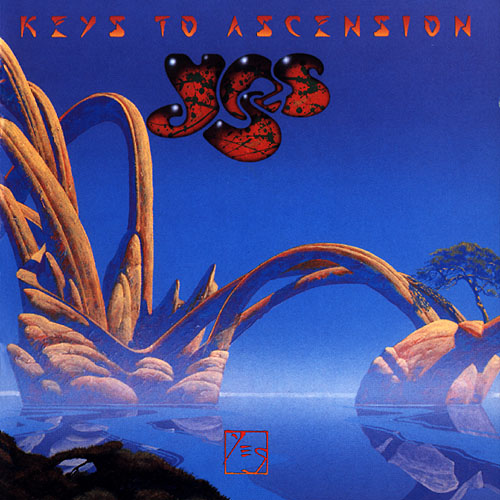
Keys to Ascension (1996)

1. Siberian Khatru
2. The Revealing Science of God
3. America
4. Onward
5. Awaken
6. Roundabout
7. Starship Trooper
8. Be the One
9. That, That Is
By the time Keys to Ascension came out in 1996, Yes was once again playing musical chairs with its lineup—no big surprise for a band with a revolving door reputation. Trevor Rabin and Tony Kaye were out. Rick Wakeman and Steve Howe were back in. Was this change permanent? Nobody knew. What was clear was that the reunion was staged mainly for a run of shows in California. Fortunately for everyone, those shows were professionally recorded and released as a double CD. Even better, they threw in two new studio cuts featuring this “classic” lineup. And yes—being that this is older-school Yes, those two songs combined clock in at over 29 minutes. No one should be shocked by that.
The live material itself? Exactly what you’d expect from this band in this configuration. Seven songs stretched across about 90 minutes—long, ambitious, and unmistakably Yes. With only seven tracks, there’s not much room for surprises in the setlist, but they do mix in a few gems alongside the predictable fan favorites. As for the sound, the band is in fine form. Critics pointed out that the official release was heavily cleaned up compared to the notorious bootlegs of these shows, and sure, there’s some studio doctoring here. But honestly? Good. I’d rather have a polished, listenable live album than a “warts and all” mess, especially given that this wasn’t a massive world tour with time to refine their chops. For what was essentially a limited-run reunion, they sound tight and energized.
The setlist even includes a few pleasant surprises. Onward, for instance—a beautiful track originally stranded on the otherwise underwhelming Tormato—gets some much-needed love here. They also pull out their sprawling cover of Simon & Garfunkel’s America. At over ten minutes, it’s no casual listen, but it’s a terrific reinterpretation that proves Yes’s old habit of reimagining other artists’ work wasn’t just a gimmick. They’d first established that approach on their earliest albums, turning straightforward pop tunes into complex prog-rock opuses, and it’s fun to hear them revisit that trick here. It’s worth noting that an earlier version of America turned up on the YesYears box set, shorter and more faithful. This live one stretches out gloriously without dragging.
But let’s be fair—no live Yes set would be complete without something from Tales from Topographic Oceans. And, as usual, that’s where my enthusiasm cools a bit. I’ve tried to appreciate those 20-minute epics more times than I can count, but they just don’t work for me. There’s ambition, and then there’s self-indulgence. Including them here weighs things down, and I can’t help but dock the album half a star just for that choice. A minor gripe in the grand scheme, but a gripe all the same.
Which brings us to the two new studio tracks: Be the One (about ten minutes) and That, That Is (a shade under twenty). This is exactly the kind of indulgence longtime fans want—and honestly, they deliver. I love both of these pieces. They may not be universally adored by the entire Yes fanbase, but they’re full of what makes this band unique: shifting sections, evolving melodies, and that unmistakable sense of grandeur. Admittedly, it’s tough to break down their structure in detail—I couldn’t give you a verse-chorus map if I tried. Instead, I judge them the way I always have with Yes epics: are they pleasant to listen to? Do they leave an impression? For both tracks, the answer is an emphatic “Yes” (pun absolutely intended).
That, That Is in particular is a monster of a track. It has a little bit of everything—beautiful melodic passages, sweeping instrumental sections, and lots of classic Steve Howe guitar work. Honestly, his playing here is a highlight. I remember worrying on the Anderson Bruford Wakeman Howe album that Howe seemed oddly subdued. No such problem here. Even people who don’t love the track as a whole usually admit his parts are brilliant. Lyrically, it’s a bit of a departure from the band’s usual cosmic and pastoral themes, tackling darker, more grounded topics like urban decay and addiction. It’s not what you expect from Yes, but it works—surprisingly well, in fact.
On the downside, Rick Wakeman’s involvement in the studio tracks was a bit fragmented. He wasn’t there for the main sessions, apparently recording his parts separately. You can tell—his presence is felt less than Howe’s. Fortunately, it doesn’t hurt the songs much. They still hold up remarkably well as Yes compositions.
And for those who wanted more? They got it the next year, with Keys to Ascension 2—essentially part two of the same project, combining more live cuts with additional new studio tracks. Honestly, I’ve always thought it might have been better if they’d just split these into a dedicated live album and a separate studio release. But that’s Yes for you. Even in the ’90s, they couldn’t do anything the simple way. In any case, Keys to Ascension remains a strong, underappreciated entry in their catalog. It deserved more attention than it got—and for fans willing to dig in, there’s a lot here worth celebrating.
Go to the Next Review
Go back to the main page